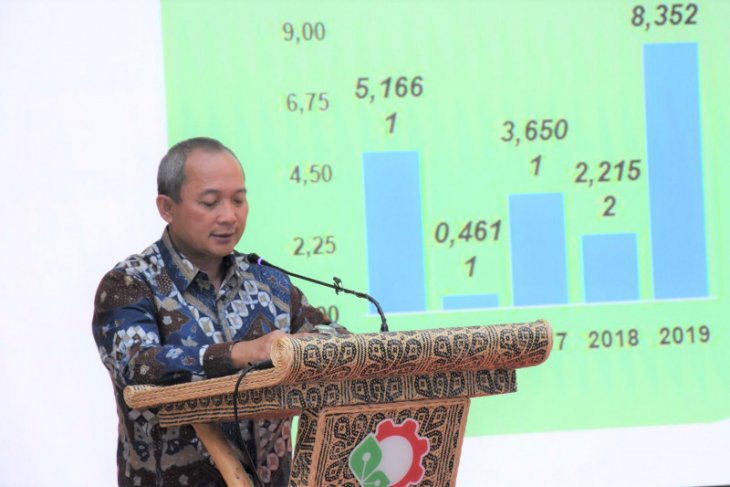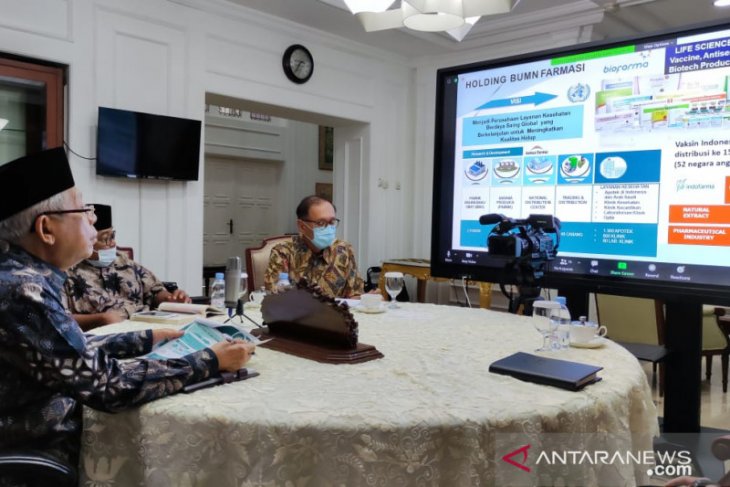Live Streaming
Program Highlight
Company Profile
August
Green Climate Fund approved REDD+ Results-Based Payment USD103,8 million
Written by nuke
PHOTO : KLHK
Indonesia secured 103,8 million USD from Green Climate Fund (GCF) for REDD+ program for reducing emissions from deforestation and forest degradation activities. This achievement shows that Indonesia efforts to mitigate climate change have the responses from received global community. This moment could be a good start for Indonesia-GCF relations in the future. In the virtual joint press conference between the Ministry of Environmental Affairs and Forestry, Ministry of Finance, Thursday August 27, Minister Environmental Affairs and Forestry Siti Nurbaya said this GCF’s recognition is to acknowledge the Indonesian government commitment to lower the gas emission of deforestation and forest degradation.
"Indonesia have recognition from the global community for the achievement to reducing the gas emission from deforestation and forest degradation activities. This recognition is approval of the Global Climate Fund (GCF) 103,8 million USD to fund the programme based on the result-based payment scheme from REDD+, namely the reducing gas emission from deforestation and forest degradation. This is testament to Indonesia commitment and achievement in controlling climate change" Minister Siti Nurbaya said.
The proposal from the Ministry of Environmental Affairs and Forestry included the result from REDD+ programme 2014-2016 period with reducing about 20,3 million tonne carbon dioxide. Meanwhile Finance Minister Sri Mulyani Indrawati said that the ministry of finance designed many of funding schemes, to support the programme to reduce the gas emission from deforestation and forest degradation activities.
"The Finance Ministry developed the climate change budget since 2016. This is our tracking commitment from budget side. We do many funding innovation such as green sukuk based on syari’I for many projects based on environmental friendly programme in line with the commitment to the climate change. The first green sukuk in 2018 with 1,25 billion USD and 2019 with 150 million USD. We also have green sukuk retail since 2019 with 1,4 trillion rupiah. That means the international attention to finance the climate change activity related is very big" Minister Sri Mulyani said
Indonesia will use the fund to strengthen the coordination, implementation REDD+ programme//NK
Indonesian Ambassador: Mexico, Indonesia's Potential Market
Written by Ani HasanahJakarta (VOI News) - The Indonesian Ambassador to Mexico, Cheppy T. Wartono, invited the Indonesian economic stakeholders and the Indonesian government to see Mexico as a potential market. This was conveyed by Cheppy T. Wartono to Voice of Indonesia in Jakarta, Thursday (27/08). Cheppy said there are 3 (three) reasons why Mexico is a potential market for Indonesia. Firstly, Mexico's population which nearly reaches 130 million people, secondly Mexico's gross domestic product (GDP) per capita of US $ 10,200, and thirdly, Mexico could become a hub for Indonesian products in Latin America and the United States.
"The first is the population that is approaching 130 million people. The second is GDP (Gross Domestic Product) per capita in Mexico which stood at 10,200 (US Dollars). Third, we can make Mexico a hub for Indonesian products to enter the Latin America market, as well as in the US market. Because we know Mexico has also enforced its USMCA (United States-Mexico-Canada Agreement) as of July 1," said Cheppy T. Wartono to Voice of Indonesia via a short message.
The Indonesian Ambassador to Mexico, Cheppy T. Wartono, further said that there are 3 steps that could be taken to improve the economic relations between Indonesia and Mexico. The first, according to Cheppy, is through a trade agreement, but not a trade agreement between Indonesia and Mexico, but a trade agreement through the Pacific Alliance of which Mexico is one of its members in addition to Chile, Peru, and Colombia.
The second step, Ambassador Cheppy T. Wartono said by doing a massive promotion. Next year Cheppy hopes to realize the Indonesian Expo in Mexico by inviting 200-300 Indonesian entrepreneurs to enter Mexico. The last step, according to Cheppy, is to create a joint committee or employers' association in these 2 countries which will be able to formulate steps, especially in the economic sector. (VOI / ADVENT / AHM)
August
Ministry Prescribes Circular Economy Route to Car Battery Development
Written by Ani Hasanah
Head of the Industry Research and Development Agency at the Ministry of Industry, Doddy Rahadi. (ANTARA/Industry Ministry Public Relations Bureau)
The Ministry of Industry is pushing for a circular economy approach in the development of domestic battery technology for supporting the national electric vehicle industry.
"Batteries are key components in electric vehicles, contributing to around 25 to 40 percent of their price," said the head of the Industry Research and Development Agency at the Ministry of Industry, Doddy Rahadi, in a statement received here on Thursday.
He made the statement at an online seminar on ‘2020 Material Technology and Engineering Goods’.
He said that electric vehicles use lithium-ion batteries with cathode active ingredients, including the elements lithium, nickel, cobalt, manganese, and aluminum. The cathode itself accounts for about 34 percent of the price of lithium battery cells.
The ministry is encouraging the processing of materials domestically to allow more economical pricing, considering Indonesia possesses abundant natural resources that can be used as active ingredients, Rahadi said.
The Ministry of Industry is trying to promote import-substitution in the energy sector by making NMC-based active cathode materials (nickel-manganese-cobalt), wherein the process of making these active materials uses Indonesian smelter industrial products. However, the import-substitution process for cathode active materials has faced problems, including sourcing of lithium, he informed.
Rahadi said Indonesia does not have natural sources of lithium and in order to overcome this problem, the Ministry of Industry has initiated a lithium recovery process from recycled used batteries. The process of recovering lithium from used batteries is also known as urban mining.
Research related to urban mining is very reliable, and developed countries are no exception, he pointed out. In producing countries, urban mining is being used as a solution to maintain sustainable production, he informed. With this innovation, Indonesia will be able to have lithium reserves even though it has no natural lithium sources, he said.
"This effort is also a form of a circular economy in the energy sector, especially electric vehicles," he remarked.
He further said that the government's seriousness in developing battery-based electric motorized vehicles is reflected by the signing of Presidential Regulation (Perpres) Number 55 of 2019 concerning the Acceleration of Electric Motor Vehicles Development.
The presidential decree can serve as the basis for automotive industry players in Indonesia to immediately compile a design for the development of electric cars.
"The government is targeting that in 2025, around 25 percent, or 400 thousand units of Low Carbon Emission Vehicles (LCEV), will be in the Indonesian market," Rahadi added.
To encourage the development of domestic electric vehicle batteries, efforts are needed to utilize existing natural resources as well as substitute imported battery components, which can be supported by the down-streaming of the lithium battery industry, he emphasized.
It is now a challenge for academics, industry players, government, researchers, engineers, and domestic associations to materialize such a concept, he said. (ANTARA)
August
VP to Bio Farma: Speed up Production of COVID-19 Vaccine
Written by Ani Hasanah
Vice President Ma'ruf Amin gets an update from PT Bio Farma on the progress of COVID-19 vaccine production, at his official residence in Jakarta on Thursday (August 27, 2020). (ANTARA / Secretariat of Vice President)
Vice President Ma'ruf Amin has asked PT Bio Farma to accelerate the production of the COVID-19 vaccine, saying that would be the most effective way to contain the pandemic.
"I hope, especially in vaccine products, I ask for it (vaccine production) to be faster because the situation really needs it. So, the only effort to overcome this COVID-19 is from (producers of) vaccines," Vice President Ma'ruf Amin said during a teleconference with the directors of PT Bio Farma in Jakarta on Thursday.
The level of transmission of COVID-19 is still quite high in Indonesia because there are still many people who are not disciplined in implementing health protocols, Ma'ruf remarked.
In addition, he noted, other efforts currently implemented by the government have not significantly reduced the spread of COVID-19 infections.
“(The steps taken by the government to curb coronavirus infections) Through health protocol efforts, through other countermeasures, are still ineffective. The healing has started well, but the transmission is still quite high," he pointed out.
Therefore, Vice President Ma'ruf directly asked the president director of PT Bio Farma, Honesti Basyir, to speed up the production process, including the halal certification process for the COVID-19 vaccine.
Meanwhile, Honesti said he would coordinate with the Indonesian Ulema Council (MUI) without delay regarding the halal certification for the vaccine.
"We will follow all of the Vice President's directions. Whatever the progress, we will immediately coordinate with the MUI team," Honesti said during the teleconference.
PT Bio Farma is working with China-based pharmaceutical company Sinovac and United Arab Emirates-based company G42 to produce COVID-19 vaccines.
Sinovac will provide raw materials to Indonesia for the production of 20 million doses of the COVID-19 vaccine by the end of 2020 and for 250 million doses by 2021. The vaccine which is being developed with raw materials procured from China is currently undergoing the third phase of clinical trials in Bandung, West Java.
Meanwhile, G42 will provide raw materials for 10 million doses by December 2020 and for 50 million doses in the first quarter of 2021. (ANTARA)



